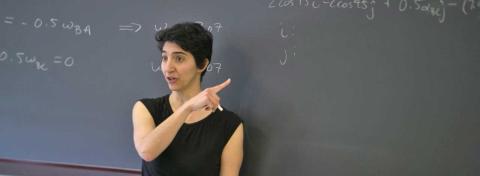
Dr. Saryn Goldberg’s fascination with science was inspired by her father, Mark an electrical engineer. To her, he seemed to understand the science behind how almost anything worked. He even built a blackboard for in her in the family playroom so they could work out homework problems together on a large space. From him, she learned the importance of asking questions and seeking her own answers to them. It’s exactly the type of relationship she strives to create with her students.
Dr. Goldberg is an associate professor of mechanical engineering in Hofstra University’s Fred DeMatteis School of Engineering and Applied Science, an on-campus faculty advisor for the Society of Women Engineers and a member of the American Society of Engineering Education (ASEE).
“I love helping students reach their ‘aha!’ moment when a new concept clicks,” Professor Goldberg said. “I love the challenge of having to think of different ways to explain a concept until it makes sense to someone. I love sharing ideas that I think are cool or eye-opening with my students.”
"I think that one of the most useful and important things that an engineering student learns as an undergraduate is how to identify what they do not understand and ask questions that move them towards understanding."
-Saryn Goldberg, Ph.D
Dr. Goldberg switched engineering specialties several times throughout her education. She completed her undergraduate degree in materials science at Brown University. She earned a masters degree from Northwestern University in biomedical engineering with a focus on biomaterials. And she earned a PhD in mechanical engineering with a focus on biomechanics from Stanford.
“I was interested in the very cool problems that biomechanics could address. The lab I joined was using computer simulation to understand how muscles contribute to walking. It was fascinating,” she said.
After graduate school she completed post-doctorate studies at the National Institutes of Health. She and her colleagues wrote an abstract on a study she conducted on gait and rehabilitation for an American Society of Biomechanics meeting (Relative Sensitivity of Net Muscular Moments to Changes in Walking Speed and Body-Weight Support) and later expanded the abstract into a paper that was published in the Journal of Biomechanics in 2013.

During her post-doc, Dr. Goldberg also served as an adjunct faculty member teaching biomechanics at The Catholic University of America and that’s where she ultimately discovered her passion for teaching.
She hopes her experience exploring and changing specialties serves as an example to her students. “I think students get very stressed about what particular flavor of engineering they are choosing to study. I like to point to my path as an example of how you can change fields along the way,” she said. “In my mind, an engineering degree shows the world that you can learn challenging material and you aren’t afraid of math – there are a lot of directions you can take those skills!”
Professor Goldberg began teaching at Hofstra in 2007. “I specifically sought out a university with an engineering program focused on undergraduates. I knew I wanted my career to focus on teaching and I wanted to work at an institution where that path would be valued,” she said.
In January 2012 she and other Hofstra colleagues outside of engineering were awarded a $150,000 National Science Foundation Research Initiation Grant in Engineering Education (RIGEE) Award for research on “Improving Learning in Engineering by Introducing a Writing-to-Learn Component to Quantitative Problem-Solving Tasks”.
And, in fall 2016 Dr. Goldberg along with other Hofstra faculty and colleagues from Virginia Tech, presented a paper at the 2016 ASEE Conference entitled “Examining Students' Metacognitive Awareness Through Analysis of Student-generated Learning Responses”. The paper was a preliminary exploration of students’ metacognitive monitoring abilities. Metacognition encourages students to examine their own thinking processes as a means of deepening their understanding -- a strategy that Professor Goldberg implements in her classroom.
Dr. Goldberg and her colleagues have developed in-class writing prompts that ask students to think about what they do not understand and ask relevant questions. In their current work, they are investigating how to teach students to identify sources of error and confusion that can then lead to more successful learning. She was invited to share her expertise on “Metacognition Across the Disciplines” at Hofstra’s Spring 2017 Distinguished Faculty Lecture.
“I think that one of the most useful and important things that an engineering student learns as an undergraduate is how to identify what they do not understand and ask questions that move them towards understanding,” Dr. Goldberg said. “Through my engineering education research I am interested in learning how I can best support students learning how to ask productive questions.”

